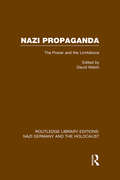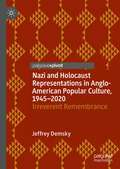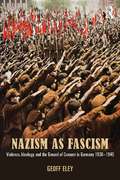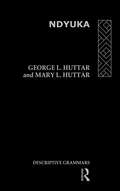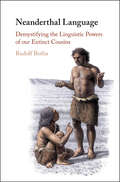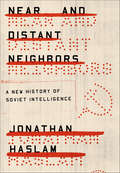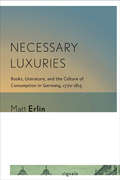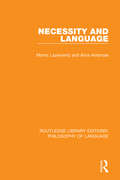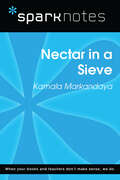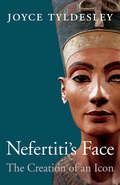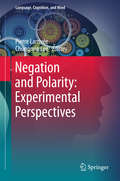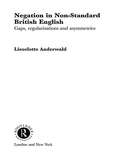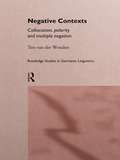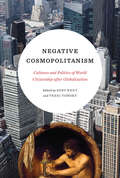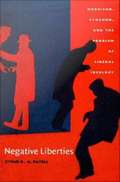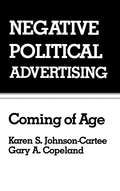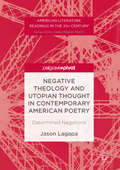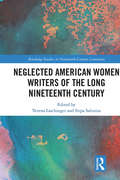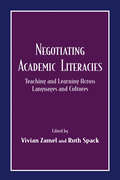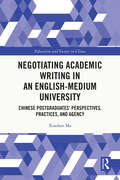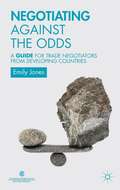- Table View
- List View
Nazi Propaganda: The Power and the Limitations (Routledge Library Editions: Nazi Germany and the Holocaust)
by David WelchBased on a detailed examination of specific aspects of Nazi propaganda, this book (originally published in 1983) enhances the understanding of National Socialism by revealing both its power and its limitations. The work tackles aspects of Nazi propaganda which had been neglected in the past, but together they demonstrate the disproportionate role assigned to propaganda in one of the most highly politicised societies in contemporary European history.
Nazi and Holocaust Representations in Anglo-American Popular Culture, 1945–2020: Irreverent Remembrance (Palgrave Studies in Cultural Heritage and Conflict)
by Jeffrey DemskyThis book analyzes sensationalized Nazi and Holocaust representations in Anglo-American cultural and political discourses. Recognizing that this history is increasingly removed from contemporary life, it explains how irreverent representations can help rejuvenate the story for successive generations of new learners. Surveying seventy-five-years of transatlantic activities, the work erects counterposing categorizes of “constructive and destructive memorializing,” providing scholars with a new framework for elucidating both this history and its historicization.
Nazism as Fascism: Violence, Ideology, and the Ground of Consent in Germany 1930-1945
by Geoff EleyOffering a dynamic and wide-ranging examination of the key issues at the heart of the study of German Fascism, Nazism as Fascism brings together a selection of Geoff Eley’s most important writings on Nazism and the Third Reich. Featuring a wealth of revised, updated and new material, Nazism as Fascism analyses the historiography of the Third Reich and its main interpretive approaches. Themes include: Detailed reflection on the tenets and character of Nazi ideology and institutional practices Examination of the complicated processes that made Germans willing to think of themselves as Nazis Discussion of Nazism’s presence in the everyday lives of the German People Consideration of the place of women under the Third Reich In addition, this book also looks at the larger questions of the historical legacy of Fascist ideology and charts its influence and development from its origin in 1930’s Germany through to its intellectual and spatial influence on a modern society in crisis. In Nazism as Fascism Geoff Eley engages with Germany’s political past in order to evaluate the politics of the present day and to understand what happens when the basic principles of democracy and community are violated. This book is essential reading not only for students of German history, but for anyone with an interest in history and politics more generally.
Nazism, the Second World War and the Holocaust in Contemporary Latin American Fiction
by Emily M. BakerAddressing the question of why many Latin American fiction authors are writing about Nazism, the Second World War and the Holocaust now, this book charts the evolution of Latin American literary production from the 19th Century, through the late 20th century 'Boom', to the present day. Containing texts from Mexico, Colombia, Brazil, Argentina and Chile, it analyses work by some of the most well-known contemporary writers including Roberto Bolaño, Juan Gabriel Vásquez, Jorge Volpi, Lucía Puenzo, Patricio Pron and Michel Laub; as well as notable precursors such as Jorge Luis Borges, Carlos Fuentes and Ricardo Piglia. Nazism, the Second World War and the Holocaust in Contemporary Latin American Fiction argues that these authors find Nazism relevant to thinking through some of the most urgent contemporary challenges we face: from racism, to the unequal division of wealth and labour between the Global 'North' and 'South'; and, of course, the general failure of democracy to eliminate fascism.
Ndyuka (Descriptive Grammars)
by George L. Huttar Mary L. HuttarFirst published in 1994. Routledge is an imprint of Taylor & Francis, an informa company.
Neanderthal Language: Demystifying the Linguistic Powers of our Extinct Cousins
by Rudolf BothaDid Neanderthals have language, and if so, what was it like? Scientists agree overall that the behaviour and cognition of Neanderthals resemble that of early modern humans in important ways. However, the existence and nature of Neanderthal language remains a controversial topic. The first in-depth treatment of this intriguing subject, this book comes to the unique conclusion that, collective hunting is a better window on Neanderthal language than other behaviours. It argues that Neanderthal hunters employed linguistic signs akin to those of modern language, but lacked complex grammar. Rudolf Botha unpacks and appraises important inferences drawn by researchers working in relevant braches of archaeology and other prehistorical fields, and uses a large range of multidisciplinary literature to bolster his arguments. An important contribution to this lively field, this book will become a landmark book for students and scholars alike, in essence, illuminating Neanderthals' linguistic powers.
Near and Distant Neighbors: A New History of Soviet Intelligence
by Jonathan HaslamA revelatory and pathbreaking account of the highly secretive world of the Soviet intelligence services A uniquely comprehensive and rich account of the Soviet intelligence services, Jonathan Haslam's Near and Distant Neighbors charts the labyrinthine story of Soviet intelligence from the October Revolution to the end of the Cold War. Previous histories have focused on the KGB, leaving military intelligence and the special service—which specialized in codes and ciphers—lurking in the shadows. Drawing on previously neglected Russian sources, Haslam reveals how both were in fact crucial to the survival of the Soviet state. This was especially true after Stalin's death in 1953, as the Cold War heated up and dedicated Communist agents the regime had relied upon—Klaus Fuchs, the Rosenbergs, Donald Maclean—were betrayed. In the wake of these failures, Khrushchev and his successors discarded ideological recruitment in favor of blackmail and bribery. The tactical turn was so successful that we can draw only one conclusion: the West ultimately triumphed despite, not because of, the espionage war. In bringing to light the obscure inhabitants of an undercover intelligence world, Haslam offers a surprising and unprecedented portrayal of Soviet success that is not only fascinating but also essential to understanding Vladimir Putin's power today.
Necessary Luxuries: Books, Literature, and the Culture of Consumption in Germany, 1770–1815
by Matt ErlinThe consumer revolution of the eighteenth century brought new and exotic commodities to Europe from abroad--coffee, tea, spices, and new textiles to name a few. Yet one of the most widely distributed luxury commodities in the period was not new at all, and was produced locally: the book. In Necessary Luxuries, Matt Erlin considers books and the culture around books during this period, focusing specifically on Germany where literature, and the fine arts in general, were the subject of soul-searching debates over the legitimacy of luxury in the modern world.Building on recent work done in the fields of consumption studies as well as the New Economic Criticism, Erlin combines intellectual-historical chapters (on luxury as a concept, luxury editions, and concerns about addictive reading) with contextualized close readings of novels by Campe, Wieland, Moritz, Novalis, and Goethe. As he demonstrates, artists in this period were deeply concerned with their status as luxury producers. The rhetorical strategies they developed to justify their activities evolved in dialogue with more general discussions regarding new forms of discretionary consumption. By emphasizing the fragile legitimacy of the fine arts in the period, Necessary Luxuries offers a fresh perspective on the broader trajectory of German literature in the late eighteenth and early nineteenth century, recasting the entire period in terms of a dynamic unity, rather than simply as a series of literary trends and countertrends.
Necessity and Language
by Morris Lazerowitz Alice AmbroseThe problem of necessity remains one of the central issues in modern philosophy. The authors of this volume, originally published in 1985, developed a new approach to the problem, which focusses on the logical grammar of necessary propositions. This volume gathers their seminal essays on the problem of necessity, together with new material at the original time publication.
Necromanticism
by Paul WestoverNecromanticism is a study of literary pilgrimage: readers' compulsion to visit literary homes, landscapes, and (especially) graves during the long Romantic period. The book draws on the histories of tourism and literary genres to highlight Romanticism's recourse to the dead in its reading, writing, and canon-making practices.
Nectar in a Sieve (SparkNotes Literature Guide Series)
by SparkNotesNectar in a Sieve (SparkNotes Literature Guide) by Kamala Markandaya Making the reading experience fun! Created by Harvard students for students everywhere, SparkNotes is a new breed of study guide: smarter, better, faster. Geared to what today's students need to know, SparkNotes provides: *Chapter-by-chapter analysis *Explanations of key themes, motifs, and symbols *A review quiz and essay topicsLively and accessible, these guides are perfect for late-night studying and writing papers
Nefertiti’s Face: The Creation of an Icon
by Joyce TyldesleyLittle is known about Nefertiti, the Egyptian queen whose name means “a beautiful woman has come.” She was the wife of Akhenaten, the pharaoh who ushered in the dramatic Amarna Age, and she bore him at least six children. She played a prominent role in political and religious affairs, but after Akhenaten’s death she apparently vanished and was soon forgotten. Yet Nefertiti remains one of the most famous and enigmatic women who ever lived. Her instantly recognizable face adorns a variety of modern artifacts, from expensive jewelry to cheap postcards, t-shirts, and bags, all over the world. She has appeared on page, stage, screen, and opera. In Britain, one woman has spent hundreds of thousands of pounds on plastic surgery in hope of resembling the long-dead royal. This enduring obsession is the result of just one object: the lovely and mysterious Nefertiti bust, created by the sculptor Thutmose and housed in Berlin’s Neues Museum since before World War II. In Nefertiti’s Face, Egyptologist Joyce Tyldesley tells the story of the bust, from its origins in a busy workshop of the late Bronze Age to its rediscovery and controversial removal to Europe in 1912 and its present status as one of the world’s most treasured artifacts. This wide-ranging history takes us from the temples and tombs of ancient Egypt to wartime Berlin and engages the latest in Pharaonic scholarship. Tyldesley sheds light on both Nefertiti’s life and her improbable afterlife, in which she became famous simply for being famous.
Negation and Polarity: Experimental Perspectives
by Chungmin Lee Pierre LarrivéeThis volume offers insights on experimental and empirical research in theoretical linguistic issues of negation and polarity, focusing on how negation is marked and how negative polarity is emphatic and how it interacts with double negation. Metalinguistic negation and neg-raising are also explored in the volume. Leading specialists in the field present novel ideas by employing various experimental methods in felicity judgments, eye tracking, self-paced readings, prosody and ERP. Particular attention is given to extensive crosslinguistc data from French, Catalan and Korean along with analyses using semantic and pragmatic methods, corpus linguistics, diachronic perspectives and longitudinal acquisitional studies as well as signed and gestural negation. Each contribution is situated with regards to major previous studies, thereby offering readers insights on the current state of the art in research on negation and negative polarity, highlighting how theory and data together contributes to the understanding of cognition and mind.
Negation in Non-Standard British English: Gaps, Regularizations and Asymmetries (Routledge Studies in Germanic Linguistics #Vol. 8)
by Lieselotte AnderwaldDespite the advances of radio and television and increasing mobility and urbanization, spoken English is by no means becoming more like the written standard. English dialect grammar, however, is still a new and relatively undeveloped area of research, and most studies to date are either restricted regionally, or based on impressionistic statements. This book provides the first thorough empirical study of the field of non-standard negation across Great Britain.
Negative Contexts: Collocation, Polarity and Multiple Negation (Routledge Studies in Germanic Linguistics)
by Ton van der WoudenThis research emphasizes semantic, syntactic and pragmatic considerations illustrating a wide array of linguistic approaches. Written from within the theoretical framework of Generalized Quantifiers, the three main areas considered are collocations, polarity items and multiple negations.
Negative Cosmopolitanism: Cultures and Politics of World Citizenship after Globalization
by Eddy Kent Terri TomskyFrom climate change, debt, and refugee crises to energy security, environmental disasters, and terrorism, the events that lead nightly newscasts and drive public policy demand a global perspective. In the twentieth century the world sought solutions through formal institutions of international governance such as the United Nations, the International Criminal Court, and the World Bank, but present-day responses to global realities are often more provisional, improvisational, and contingent. Tracing this uneven history in order to identify principal actors, contesting ideologies, and competing rhetoric, Negative Cosmopolitanism challenges the Kantian ideal of cosmopolitanism as the precondition for a perpetual global peace. Uniting literary scholars with researchers working on contemporary problems and those studying related issues of the past – including slavery, industrial capitalism, and corporate imperialism – essays in this volume scrutinize the entanglement of cosmopolitanism within expanding networks of trade and global capital from the eighteenth century to the present. By doing so, the contributors pinpoint the ways in which whole populations have been unwillingly caught up in a capitalist reality that has little in common with the earlier ideals of cosmopolitanism. A model for provoking new and necessary questions about neoliberalism, biopolitics, colonialism, citizenship, and xenophobia, Negative Cosmopolitanism establishes a fresh take on the representation of globalization and modern life in history and literature. Contributors Include Timothy Brennan (University of Minnesota), Juliane Collard (University of British Columbia), Mike Dillon (California State University, Fullerton), Sneja Gunew (University of British Columbia), Dina Gusejnova (University of Sheffield), Heather Latimer (University of British Columbia), Pamela McCallum (University of Calgary), Geordie Miller (Dalhousie University), Dennis Mischke (Universität Stuttgart), Peter Nyers (McMaster University), Liam O’Loughlin (Pacific Lutheran University), Crystal Parikh (New York University), Mark Simpson (University of Alberta), Melissa Stephens (Vancouver Island University), and Paul Ugor (Illinois State University).
Negative Liberties: Morrison, Pynchon, and the Problem of Liberal Ideology
by Cyrus R. K. PatellSince the nineteenth century, ideas centered on the individual, on Emersonian self-reliance, and on the right of the individual to the pursuit of happiness have had a tremendous presence in the United States--and even more so after the Reagan era. But has this presence been for the good of all? In Negative Liberties Cyrus R. K. Patell revises important ideas in the debate about individualism and the political theory of liberalism. He does so by adding two new voices to the current discussion--Toni Morrison and Thomas Pynchon--to examine the different ways in which their writings embody, engage, and critique the official narrative generated by U. S. liberal ideology. Pynchon and Morrison reveal the official narrative of individualism as encompassing a complex structure of contradiction held in abeyance. This narrative imagines that the goals of the individual are not at odds with the goals of the family or society and in fact obscures the existence of an unholy truce between individual liberty and forms of oppression. By bringing these two fiction writers into a discourse dominated by Ralph Waldo Emerson, Isaiah Berlin, John Rawls, George Kateb, Robert Bellah, and Michael Sandel, Patell unmasks the ways in which contemporary U. S. culture has not fully shed the oppressive patterns of reasoning handed down by the slaveholding culture from which American individualism emerged. With its interdisciplinary approach, Negative Liberties will appeal to students and scholars of American literature, culture, sociology, and politics.
Negative Political Advertising: Coming of Age (Routledge Communication Series)
by Karen S. Johnson-Cartee Gary CopelandThis volume provides a unique synthesis of the relevant literature from academic studies in the fields of political science, marketing, advertising, speech communication, telecommunication, and public relations combined with the practical wisdom of professional consultants. Offering the reader both the theory and practical applications associated with negative political advertising, this is the first book devoted exclusively to the various forms of negative campaigning in the United States. After developing a typology of negative political spots for greater clarity in explaining and evaluating them, the book addresses effectiveness questions such as: What works? When? Why? and How?
Negative Theology and Utopian Thought in Contemporary American Poetry
by Jason LagapaThis book explores the utopian imagination in contemporary American poetry and the ways in which experimental poets formulate a utopian poetics by adopting the rhetorical principles of negative theology, which proposes using negative statements as a means of attesting to the superior, unrepresentable being of God. With individual chapters on works by such poets as Susan Howe, Nathaniel Mackey, Charles Bernstein, and Alice Notley, this book illustrates how a strategy of negation similarly proves optimal for depicting the subject of utopia in literary works. Negative Theology and Utopian Thought in Contemporary American Poetry: Determined Negations contends that negative statements in experimental poetry illustrate the potential for utopian social change, not by portraying an ideal world itself but by revealing the very challenge of representing utopia directly.
Neglected American Women Writers of the Long Nineteenth Century: Progressive Pioneers (Routledge Studies in Nineteenth Century Literature)
by Sirpa Salenius Verena LaschingerNeglected American Women Writers of the Long Nineteenth Century, edited by Verena Laschinger and Sirpa Salenius, is a collection of essays that offer a fresh perspective and original analyses of texts by American women writers of the long nineteenth century. The essays, which are written both by European and American scholars, discuss fiction by marginalized authors including Yolanda DuBois (African American fairy tales), Laura E. Richards (children’s literature), Metta Fuller Victor (dime novels/ detective fiction), and other pioneering writers of science fiction, gothic tales, and life narratives. The works covered by this collection represent the rough and ragged realities that women and girls in the nineteenth century experienced; the writings focus on their education, family life, on girls as victims of class prejudice as well as sexual and racial violence, but they also portray girls and women as empowering agents, survivors, and leaders. They do so with a high-voltage creative charge. As progressive pioneers, who forayed into unknown literary terrain and experimented with a variety of genres, the neglected American women writers introduced in this collection themselves emerge as role models whose innovative contribution to nineteenth-century literature the essays celebrate.
Negotiating Academic Literacies: Teaching and Learning Across Languages and Cultures
by Ruth Spack Vivian ZamelNegotiating Academic Literacies: Teaching and Learning Across Languages and Cultures is a cross-over volume in the literature between first and second language/literacy. This anthology of articles brings together different voices from a range of publications and fields and unites them in pursuit of an understanding of how academic ways of knowing are acquired. The editors preface the collection of readings with a conceptual framework that reconsiders the current debate about the nature of academic literacies. In this volume, the term academic literacies denotes multiple approaches to knowledge, including reading and writing critically. College classrooms have become sites where a number of languages and cultures intersect. This is the case not only for students who are in the process of acquiring English, but for all learners who find themselves in an academic situation that exposes them to a new set of expectations. This book is a contribution to the effort to discover ways of supporting learning across languages and cultures--and to transform views about what it means to teach and learn, to read and write, and to think and know. Unique to this volume is the inclusion of the perspectives of writers as well as those of teachers and researchers. Furthermore, the contributors reveal their own struggles and accomplishments as they themselves have attempted to negotiate academic literacies. The chronological ordering of articles provides a historical perspective, demonstrating ways in which issues related to teaching and learning across cultures have been addressed over time. The readings have consistency in terms of quality, depth, and passion; they raise important philosophical questions even as they consider practical classroom applications. The editors provide a series of questions that enable the reader to engage in a generative and exciting process of reflection and inquiry. This book is both a reference for teachers who work or plan to work with diverse learners, and a text for graduate-level courses, primarily in bilingual and ESL studies, composition studies, English education, and literacy studies.
Negotiating Academic Writing in an English-Medium University: Chinese Postgraduates’ Perspectives, Practices, and Agency (Education and Society in China)
by Xiaohao MaBuilding on a collection of students’ perspectives and narratives, Ma examines how non-native English speaking (NNES) students negotiate English academic writing (EAW) to reveal the general patterns and distinct routes in addressing challenges in higher education.With the significant expansion of internationalization and student mobility, the discourse on cross-border education and how NNES students navigate the high-stakes educational journey remain pertinent. This book presents an in-depth qualitative study that investigates how NNES students in an English-medium university negotiate the demands of EAW in postgraduate study. The research foregrounds NNES students’ experiences and provides a comprehensive understanding of how they perceive, experience, and address the challenges of EAW by focusing on a group of mainland Chinese students studying in Hong Kong. Key topics discussed include the impact of English as an academic lingua franca on non-native speakers, the roles of universities in supporting these students, and lessons of individuals addressing academic challenges.Written for NNES students, researchers and practitioners in higher education, including language professionals and other specialists in language teaching, this compelling text will also interest general readers of academic and linguistic literacy.
Negotiating Against the Odds
by Emily JonesDrawing on the experiences of more than 100 developing country negotiators and the insights of leading academic studies, this guide brings together practical advice and lessons on ways to negotiate effectively with larger parties, and avoid common pitfalls.
